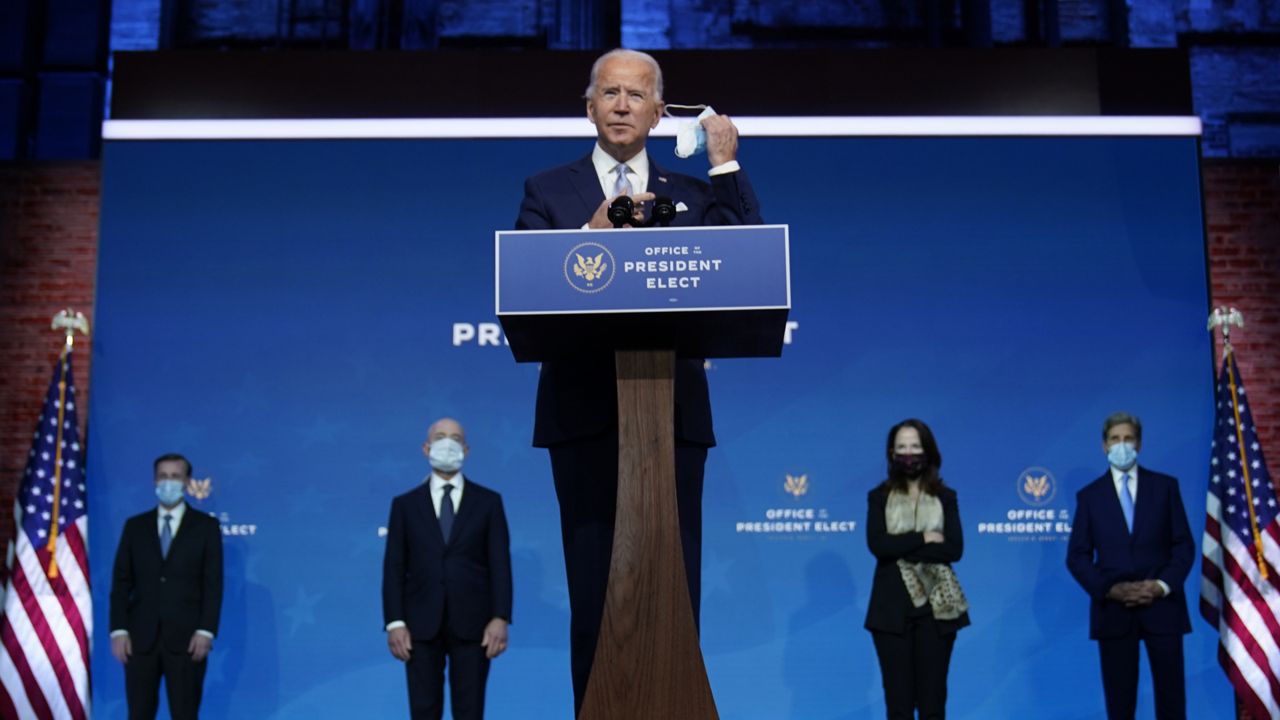President Joe Biden wasted no time during his first few days in office, signing a slew of executive orders and calling on Congress to confirm his Cabinet nominees as quickly as possible.
Biden had long pledged to build a Cabinet as diverse as the nation it represents, and lawmakers had applauded the president for keeping his promise.
Many on Biden’s newly-assembled team represent historic firsts in the federal government: should her nomination be approved, Marcia Fudge would be the first woman in over 40 years and second-ever Black woman in history to lead the Department of Housing and Development. Katherine Tai, Biden’s pick to act as U.S. Trade Representative, would likewise make history as the first Asian American and first woman of color to serve in the role, should she be confirmed.
The Cabinet is typically made up of the vice president and the heads of the 15 federal executive departments like the Treasury, Homeland Security, Veterans Affairs, and more. Biden expanded his Cabinet by adding the U.S. Ambassador to the United Nations, the Director of National Intelligence, and the U.S. Trade Representative as top-level positions in need of confirmation.
All Cabinet members must be approved by a simple majority vote in the Senate, save for several high-level appointees chosen by the president, including the chief of staff.
The process for confirmation varies based on “the importance of the position involved, existing political circumstances, and policy implications,” according to the Congressional Research Service. Usually, the Senate’s executive clerk will refer a nominee to a specific Senate committee, which then investigates and questions the nominee before sending a recommendation to the full Senate body. In some circumstances, nominees can bypass committee hearings altogether and head straight to the Senate floor for a confirmation vote.
The Senate has already begun the process of debating Biden’s nominees, with two already confirmed less than three days after the president took office. More hearings are set to take place in the coming weeks — here’s when you can expect to see those 15 department heads officially confirmed:
Department of Homeland Security Secretary: Alejandro Mayorkas
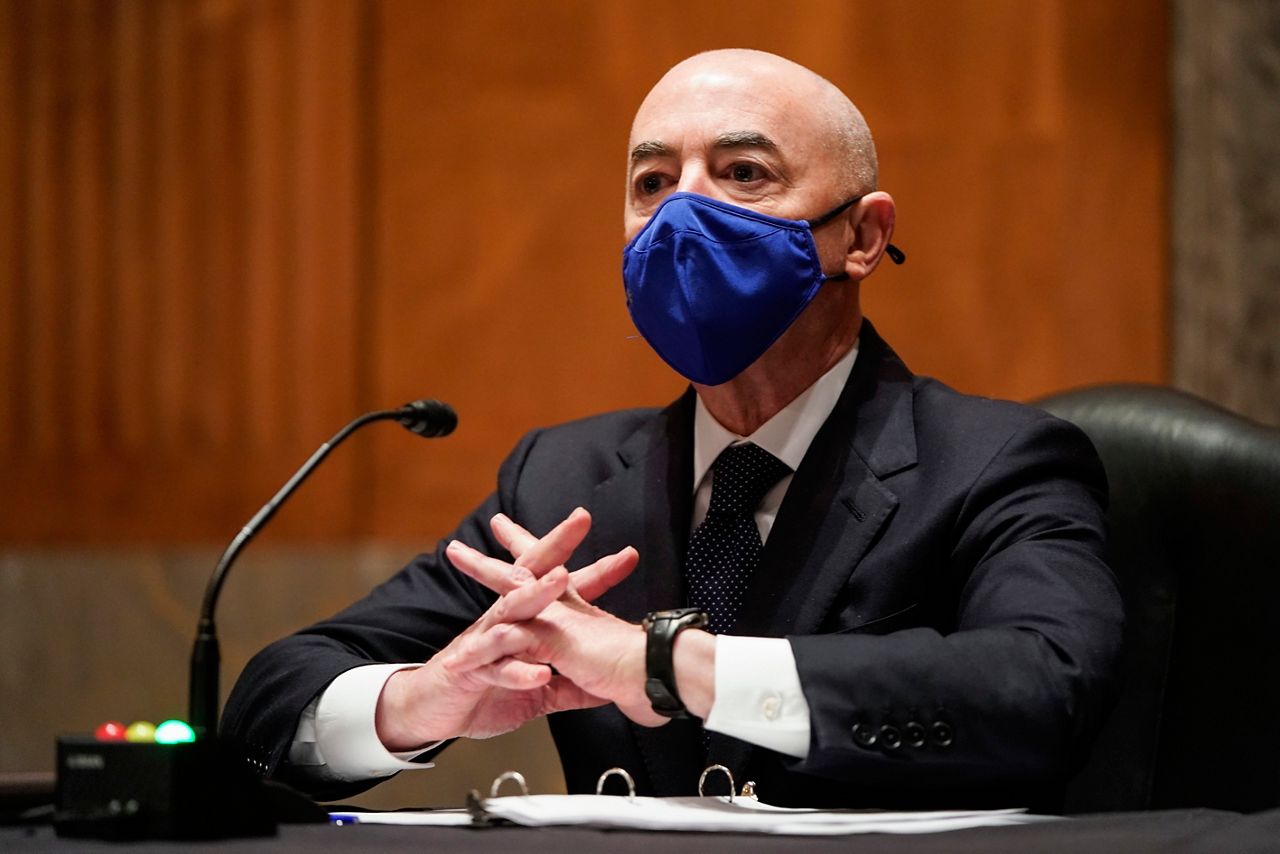
The Senate voted to confirm Alejandro Mayorkas to lead the Department of Homeland Security on Tuesday, the same day that President Joe Biden plans to sign executive orders to build on his efforts to undo former president Donald Trump’s restrictive immigration policies.
The final vote, which was largely along party lines, was 56-43, with 6 Republicans joining Democrats in supporting Mayorkas' confirmation. Sens. Romney (R-UT) and Collins (R-ME) were notable Republican votes to confirm Mayorkas.
Mayorkas will be the first Latino and the first immigrant to run the department, where he previously served as deputy secretary in the Obama-Biden administration. Mayorkas previously served as Director of United States Citizenship and Immigration Services (CIS) and was United States Attorney for the Central District of California under former president Bill Clinton.
Transportation Secretary: Pete Buttigieg
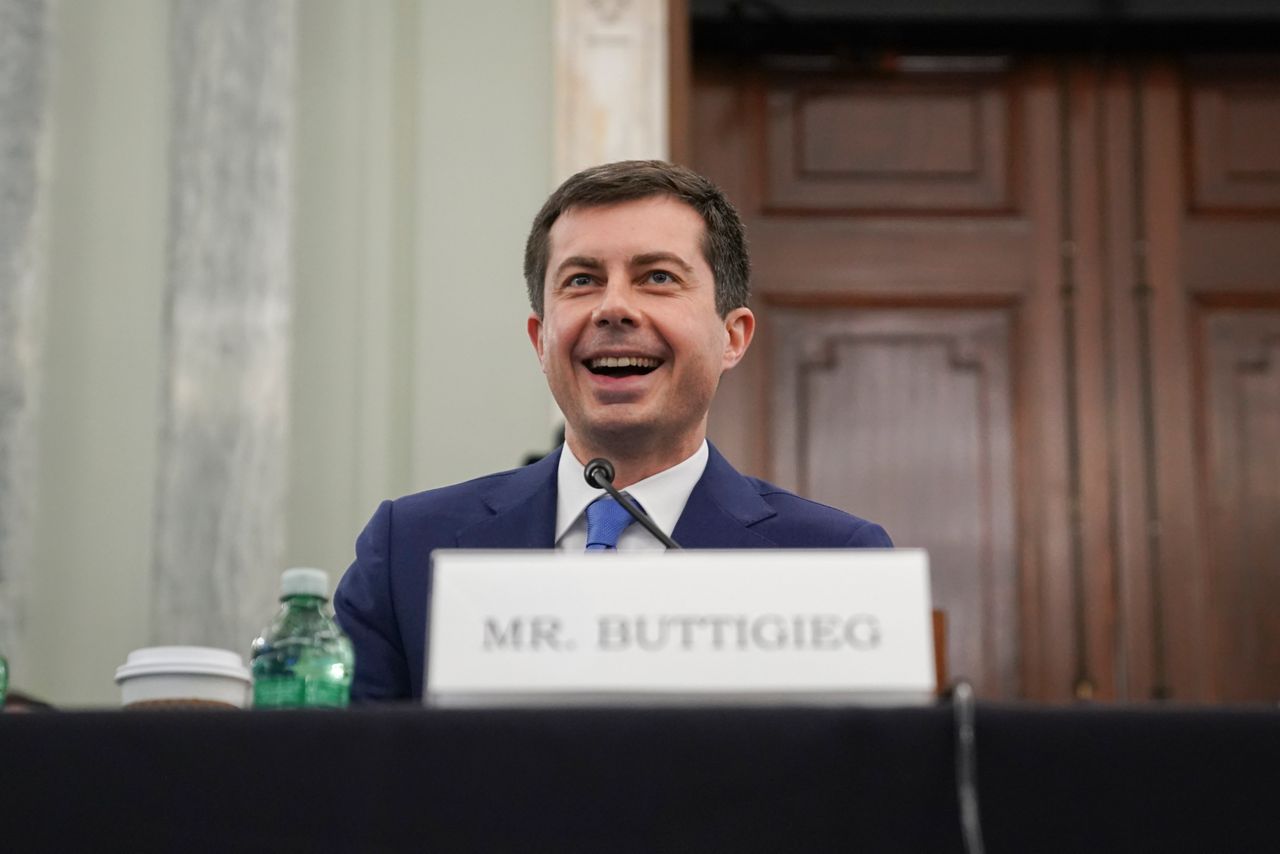
The Senate voted on Tuesday, Feb. 2 to confirm former presidential candidate and South Bend, Indiana, mayor Pete Buttigieg as transportation secretary, the first openly gay person to be confirmed to a Cabinet post.
The final vote was 86-13. A number of prominent Republicans, including Senate Minority Leader Mitch McConnell and both of Indiana's senators, Sens. Mike Braun and Todd Young.
"I'm excited to call him Secretary Pete," Senate Majority Leader Chuck Schumer said on the Senate floor on ahead of the vote.
Prominent "no" votes included Sens. Ted Cruz (R-TX), Josh Hawley (R-MO), and Tom Cotton (R-AK).
Praised by Biden as bringing a “new voice” to the administration, Buttigieg would take over a Transportation Department with 55,000 employees and a budget of tens of billions of dollars.
Buttigieg has pledged to quickly get to work promoting safety and restoring consumer trust in America’s transportation networks as airlines, buses, city subway systems, and Amtrak reel from plummeting ridership in the coronavirus pandemic.
He is also expected to play a large role in the Biden administration’s climate initiatives and infrastructure plans, two critical positions for the president.
Secretary of State: Antony Blinken
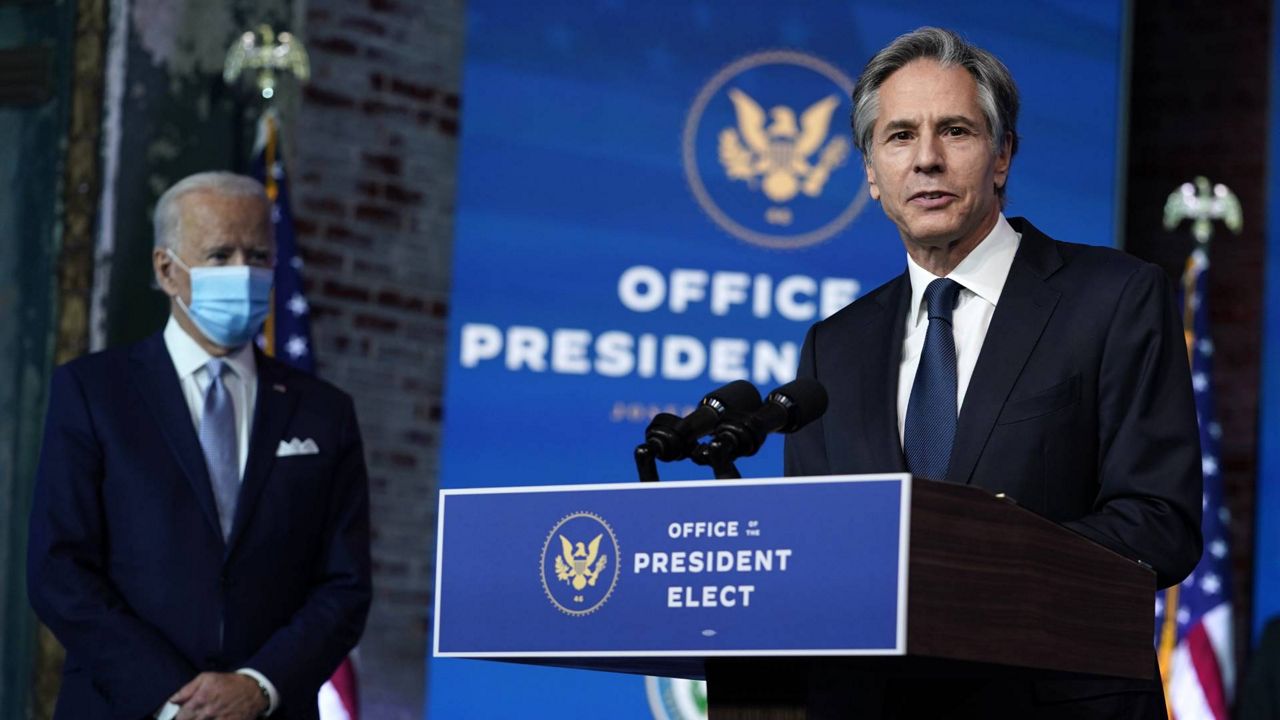
The Senate voted to confirm President Joe Biden’s nominee Antony Blinken as Secretary of State on Tuesday, where he is expected to face the challenge of restoring the United States’ place on the world stage after the Trump administration’s “America First” foreign policy.
The final vote was 78-22.
Blinken, a veteran diplomat under former president Barack Obama and longtime adviser to President Joe Biden, received wide bipartisan support from the Foreign Relations Committee on Monday, with a vote of 15-3 – only Sens. Ted Cruz (R-TX), Rand Paul (R-KY), and John Barrasso (R-WY) voted against advancing Blinken to the Senate.
Blinken started at the State Department under the Clinton administration, before serving as Biden’s National Security Advisor when he was vice president. He later served as Deputy National Security Advisor and Deputy Secretary of State in the Obama administration.
Notably, Blinken was in the Situation Room during the 2011 raid that killed Osama Bin Laden as Biden’s National Security Advisor, and a major part in formulating the Obama administration’s response to the Russia’s annexation of the Crimean Peninsula in 2014 as Deputy National Security Advisor.
Treasury Secretary: Janet Yellen
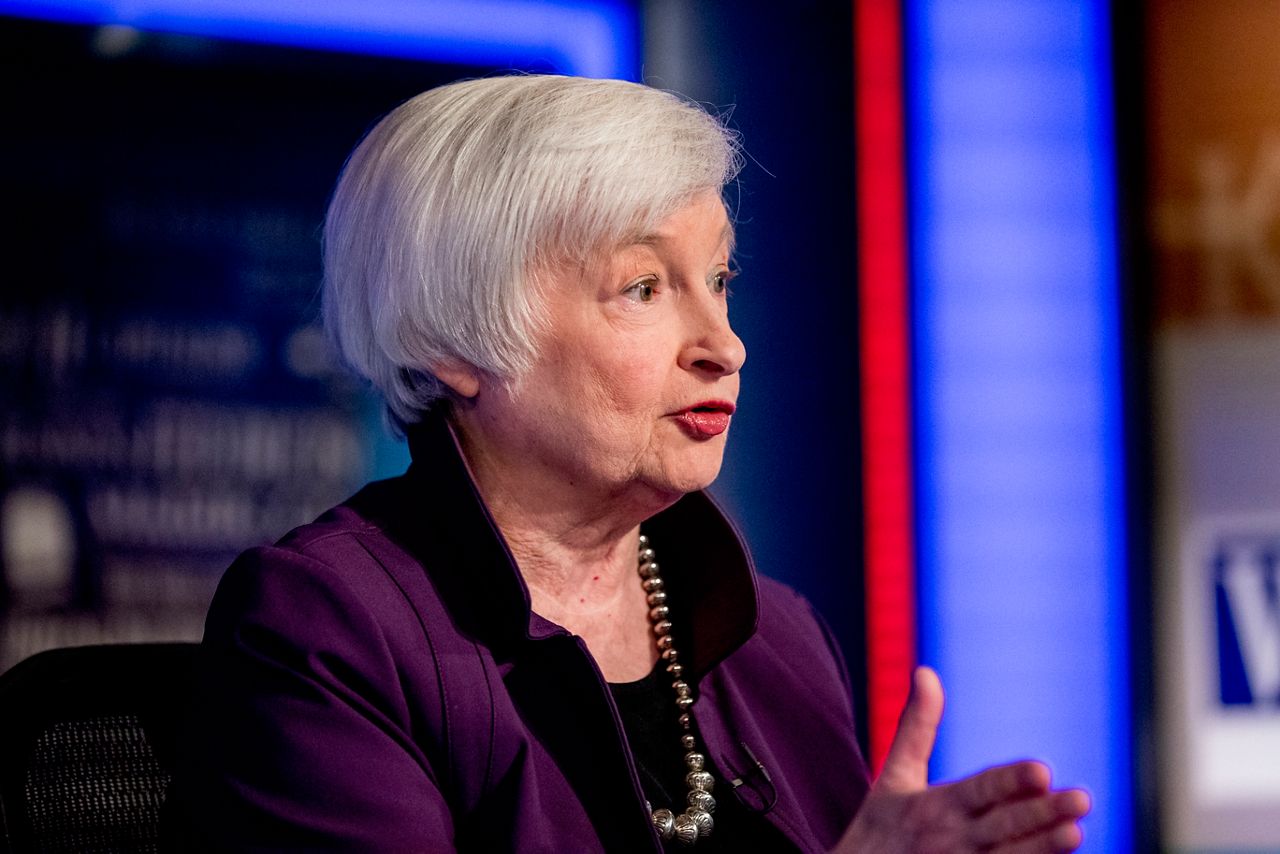
The U.S. Senate voted to confirm Janet Yellen to be the 78th Secretary of the Treasury, making her the first woman to lead the department in its nearly 232-year history. The final vote was 84-15.
Yellen was unanimously approved by the Senate Finance Committee with a 26-0 vote last week. The Biden Administration urged a quick confirmation for Yellen to help combat the economic crisis, including the $1.9 trillion COVID-19 relief measure the president proposed.
At her confirmation hearing before the Finance Committee last Tuesday, Yellen had argued that without prompt action the nation faced the threat of a “longer, more painful recession.” She urged quick action on the package that would provide an additional $1,400 in payments to individuals making below $75,000 annually as well as providing expanded unemployment benefits, further aid for small businesses and support for cities and states to prevent layoffs.
Director of National Intelligence: Avril Haines
The Senate on Wednesday confirmed Avril Haines as director of national intelligence, giving President Joe Biden the first member of his Cabinet and placing the first woman in charge of the nearly two-decade old agency.
Haines, a former deputy director of the CIA and deputy national security adviser in the Obama administration, was confirmed with an overwhelming 84-10 vote, signaling a bipartisan desire for confirming Biden's national security nominees and installing strong leadership after four turbulent years for the intelligence community.
It’s traditionally a show of good faith on Inauguration Day to confirm at least some nominees for a new president’s administration.
Secretary of Defense: Gen. Lloyd T. Austin
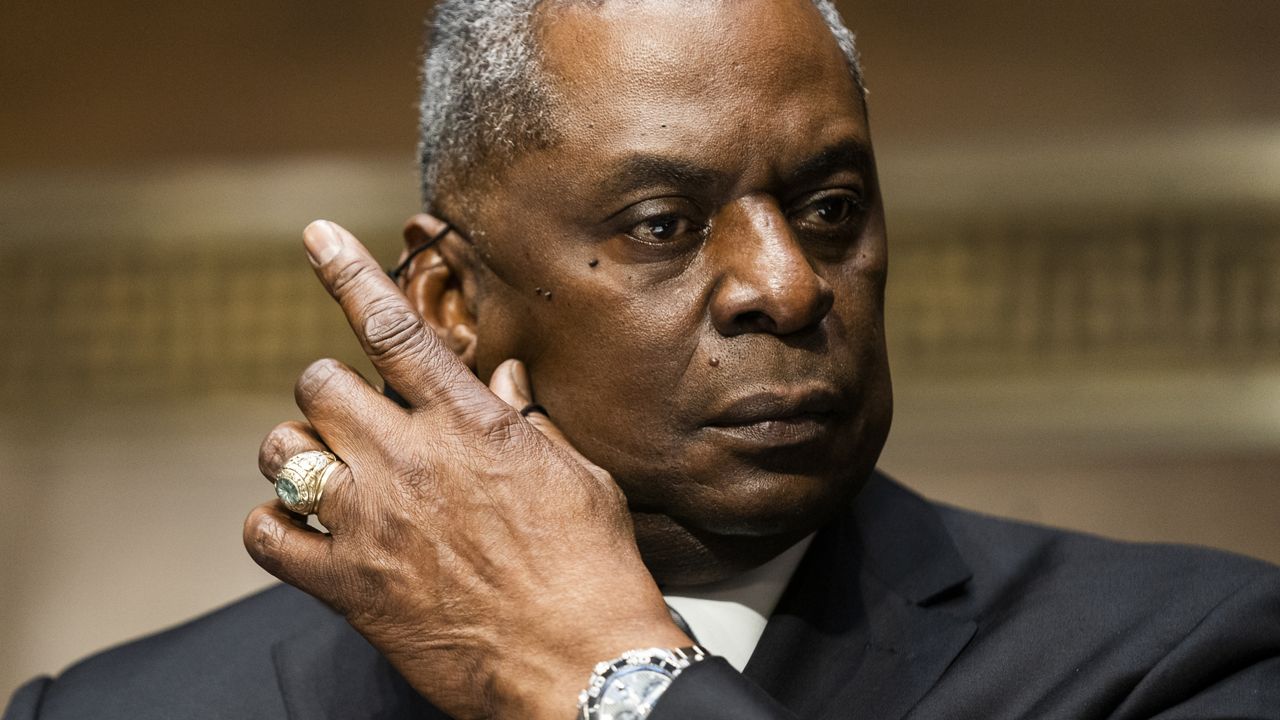
The Senate voted to confirm Ret. General Lloyd Austin as the Secretary of Defense on Friday. He will be the first Black leader of the Pentagon in U.S. history.
Senators confirmed President Biden’s nominee in a 93 to 2 vote. Republican Senators Mike Lee of Utah and Josh Hawley of Missouri were the only Senators who voted against the confirmation.
The Senate voted one day after approving a waiver that allows Austin to serve as secretary even though he retired five years ago, within the seven-year waiting period usually required to ensure civilian leadership of the military.
Secretary of Veterans Affairs: Denis McDonough
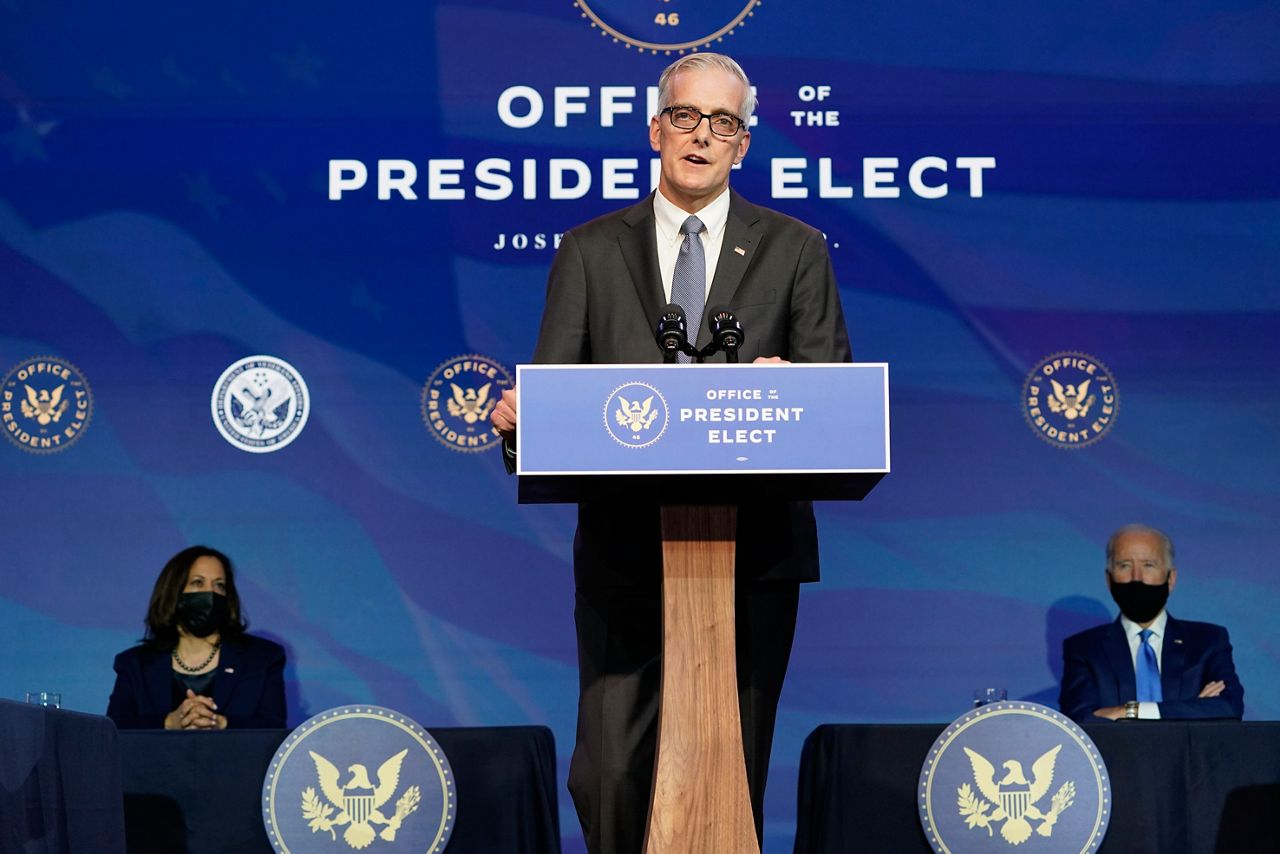
The Senate on Monday voted 87-7 in favor of approving Denis McDonough’s nomination to head the Department of Veterans Affairs.
Republican Senators Ted Cruz (TX), Bill Hagerty (TN), Joni Ernst (IA), Roger Marshall (KS), Josh Hawley (MO), Rick Scott (FL), and Tom Cotton (AR) voted against confirming McDonough as VA Secretary.
But Democrats praised McDonough’s leadership style, with many citing his years of public service as reason to approve his nomination.
“(McDonough) is an experienced public servant who knows how to deliver results and I know he will work hard to get the job done for our veterans and their families,” tweeted Sen. Tammy Baldwin ahead of Monday’s vote.
“Denis McDonough has demonstrated that he is unequivocally the man for this job,” Sen. Jon Tester said on the Senate floor, adding: “He will be held accountable when it comes to swiftly implementing a number of historic reforms.”
McDonough, who never served in the armed forces, will head a sprawling agency that has presented organizational challenges for both parties over the years.
Biden tapped the nominee not for his service record, but his experience navigating Washington bureaucracy — McDonough was credited with helping Obama try to bridge divides on Capitol Hill, including around one of his most substantial second-term legislative achievements: the Veterans Choice Act.
Upon introducing McDonough as his nominee for VA secretary in late December 2020, Biden said he “shares my belief that we have many obligations as a nation, but we have only one, truly sacred obligation: To prepare and equip our troops that we send in harm’s way and then to care for them — and their families — when they return.”
In his testimony in front of the Senate Veterans' Affairs Committee on Wednesday, Jan. 27, McDonough pledged to assist the nation's veterans through the coronavirus pandemic.
"This won’t be easy," McDonough said in his prepared remarks. "The Department of Veterans Affairs faces great challenges, challenges made even more daunting by the coronavirus pandemic. Its capabilities have not always risen to the needs of our veterans.”
Nominee for Commerce Secretary: Gina Raimondo
Rhode Island Gov. Gina Raimondo, Biden's nominee to serve as Commerce Secretary, is testifying before the Senate Commerce Committee Tuesday in her first confirmation hearing.
Gov. Raimondo, the first woman to serve as Governor of Rhode Island, co-founded the state's first venture capital firm before becoming the state's general treasurer in 2011.
She ran for governor in 2014 and won, and was re-elected in 2018; she also served as chair of the Democratic Governors Association.
Appearing virtually before the committee, she said in her opening remarks that, "the Commerce Department has a simple but vital mission: to spur good-paying jobs, empower entrepreneurs to innovate and grow, and help American workers and businesses compete."
The Senate Commerce Committee advanced Raimondo's nomination to the full Senate with a bipartisan 21-3 vote. Three GOP Senators —Ted Cruz of Texas, Rick Scott of Florida, and Marsha Blackburn of Tenneessee — voted against Raimondo's nomination.
Nominee for Energy Secretary: Jennifer Granholm
Granholm appeared before the Senate Energy and Natural Resources Committee for the first time on Wednesday, Jan. 27, where she was questioned at length about her views on climate change.
The former Michigan governor talked about the need for the U.S. to lead the way on developing clean energy technology, and compared it to the auto industry.
"We weren't going to abandon the automobile, but if we could make the next generation of automobile and be successful at it, that is an opportunity for job creation," Granholm said.
On Tuesday, Feb. 2, the Committee advanced Granholm's nomination with a 13-4 vote.
Nominee for Housing and Urban Development Secretary: Marcia Fudge
Fudge appeared before the Senate Committee on Banking, Housing and Urban Affairs for the first time on Thursday, Jan. 28. The sitting Congresswoman from Ohio said in her opening remarks that she has spent her entire career focusing on low-income families, seniors, and communities — and plans to continue her work in the Biden-Harris administration should her nomination be approved.
Fudge also stressed the need to address the current housing crisis, which she said has been further compounded by the coronavirus pandemic.
"Much like COVID19, the housing crisis isn’t isolated by geography. It is the daily reality for tens of millions of our fellow Americans — people in blue states and red states, in cities and small towns," Fudge said. "My first priority as Secretary would be to alleviate that crisis and get people the support they need to come back from the edge."
Several Republicans on the committee expressed concerns about Fudge's ability to practice bipartisanship, citing her heated criticism of GOP efforts to push through Amy Coney Barrett's confirmation to the Supreme Court in the wake of Justice Ruth Bader Ginsburg's death.
Fudge was advanced by the Senate Committee on Banking, Housing and Urban Affairs by a vote of 17-7 on Thursday, Feb. 4.
Nominee for Agriculture Secretary: Tom Vilsack
Vilsack appeared before the Senate Agriculture, Nutrition, and Forestry Committee on Tuesday, pledging to focus on climate change initiatives and work to address racial inequities in agricultural assistance programs should his nomination be confirmed.
Vilsack would bring much on-the-job experience to the position. In addition to serving two terms as the governor of Iowa, he spent eight years as President Barack Obama’s Agriculture Secretary.
In his opening remarks, Vilsack, 70, sought to dispel concerns that he would be coming to the job with antiquated ideas.
“I realize that I am back again. But I also realize that this is a fundamentally different time,” he said, referencing a need to rebuild parts of the country’s agricultural infrastructure in the wake of the COVID-19 pandemic.
Vilsack seems to enjoy bipartisan support and faced no serious criticism from Republicans on the committee. Senators from both parties seemed to treat his confirmation as a foregone conclusion, and at one point New York Democrat Kirsten Gillibrand referred to Vilsack as “Mr. soon-to-be Secretary.”
Nominee for Environmental Protection Agency Administrator: Michael Regan
Regan appeared before the Senate Committee on Environment and Public Works on Weds., Feb. 3.
Regan told the Senate committee that under Biden the EPA “will stand up for environmental justice and equity″ and will collaborate with business and community groups, state and local governments and others “who know their own communities better than the federal government ever could.″
Under questioning from Republican senators, Regan vowed to “follow the law, not exceed my statutory authority” to complete major new regulations on power plants, automobile tailpipes, mercury emissions and waterways — all of which will likely face strong GOP opposition.
Regan, who has served as top environmental regulator in North Carolina since 2017, would be the first African American to run the EPA. He made a name for himself in his home state by pursuing cleanups of industrial toxins and helping low-income and minority communities significantly affected by pollution.
If confirmed by the Senate, Regan would take over the EPA after four years in which former President Donald Trump sought to weaken or eliminate dozens of key public health and environmental protections for clean air, water and climate-changing carbon pollution.
Nominee for U.S. Ambassador to the United Nations: Linda Thomas-Greenfield
The Senate Foreign Relations Committee approved Thomas-Greenfield’s nomination by an 18-4 vote on Thursday, Feb. 4. Her nomination will now be sent to the full Senate for a vote.
Republican Sen. Ted Cruz of Texas was one of Thomas-Greenfield’s most vocal critics, saying he has “no confidence” she would be tough enough on China should her nomination be approved.
“We need a UN Ambassador who will stand up to China, to China's pervasive influence,” Cruz said in part, adding: “And given her record, I have no confidence (Linda Thomas-Greenfield) will do so."
GOP Senators Barrasso, Rubio and Hagerty also voted against Thomas-Greenfield’s nomination. But Democrats on the committee defended the nominee’s record, with Sen. Jeanne Shaheen of New Hampshire saying Thomas-Greenfield is "absolutely tough enough" for the job.
Nominee for Secretary of Labor: Marty Walsh
Boston Mayor Marty Walsh appeared before the Senate Health, Education, Labor and Pensions Committee on Thursday, Feb. 4.
Walsh has been the mayor of boston since 2014; he has also previously served as a union leader, and a state representative.
Walsh told Senators on Thursday how his experience has prepared him to fight for all workers — including women and racial minorities.
“We’re dealing with a system of systemic racism that we have to continually address,” Walsh said. “And it’s not just fancy words in policies, it’s doing the work and rolling up our sleeves.”
The Senate Health, Education, Labor and Pensions Committee approved the nomination of Marty Walsh to be Labor secretary in a 18-4 vote on Feb. 11, 2021.
Nominee for Chair of the Council of Economic Advisers: Cecilia Rouse
Rouse, a noted economist and dean of the Princeton School of Public and International Affairs at Princeton University, was advanced unanimously by the Senate Committee on Banking, Housing, and Urban Affairs on Thursday, Feb. 4.
Nominee for Administrator of the Environmental Protection Agency: Michael Regan
With a 14-6 vote, the Senate Environment and Public Works Committee voted on Tuesday, Feb. 9 to advance Michael Regan, President Joe Biden's nominee to run the Environmental Protection Agency, to a full Senate vote.
At his hearing last week, Regan pledged to move with “a sense of urgency” on climate change and said that the agency "will stand up for environmental justice and equity."
Nominee for Director of the Office of Management and Budget: Neera Tanden
In her opening remarks before the Senate Homeland Security & Governmental Affairs Committee on Tuesday, Feb. 9, President Joe Biden's nominee for Director of the Office of Management and Budget, Neera Tanden, discussed the importance of public assistance programs in her own upbringing – highlighting her mother's experience raising her and her brother as a single parent.
"We relied on food stamps to eat, and Section 8 vouchers to pay the rent," she recalled. "At school, I remember being the only kid in the cafeteria line who used ten-cent vouchers from the Free Lunch Program. I remember using food stamps at the grocery store."
"Within just a few years, my mother found a job, and a few years later she was earning a middle class salary," she went on to say. "Soon, she was able to buy a home, and eventually see her children off to college and beyond. I spend every day of my life grateful for a nation, and a government, that had faith in my mother and in me — that invested in our humanity and gave me a fair shot to pursue my potential. As I sit before this Committee, I’m mindful that my path in life would never have been possible without budgetary choices that reflected our nation’s values — many of them made in the very agency I am now nominated to lead."
Tanden urged that she will work with both Democrats and Republicans to get things done: "Over the last few years, it’s been part of my role to be an impassioned advocate. I understand, though, that the role of OMB Director calls for bipartisan action, as well as a nonpartisan adherence to facts and evidence. I would vigorously enforce my ironclad belief that our government should serve all Americans — regardless of party — in every corner of the country.“
She also apologized for some of her past rhetoric, which has garnered her some criticism from Republicans: "I regret that language and take responsibility for it."
Tanden likely faces an easier path to confirmation because Democrats control the Senate, but she will no doubt face tough questions from Republicans about her role as a partisan advocate, as well as from Democrats about transparency at the agency.
Nominee for Education Secretary: Miguel Cardona
The Senate Health, Education, Labor and Pensions Committee approved the nomination of Miguel Cardona to be Education secretary by a 17-5 vote on Feb. 11, 2021.
Nominee for Attorney General: Merrick Garland
No information on hearing dates.
Nominee for Interior Secretary: Deb Haaland
No information on hearing dates.
Nominee for Health and Human Services Secretary: Xavier Becerra
No information on hearing dates.
The Associated Press contributed to this report.



